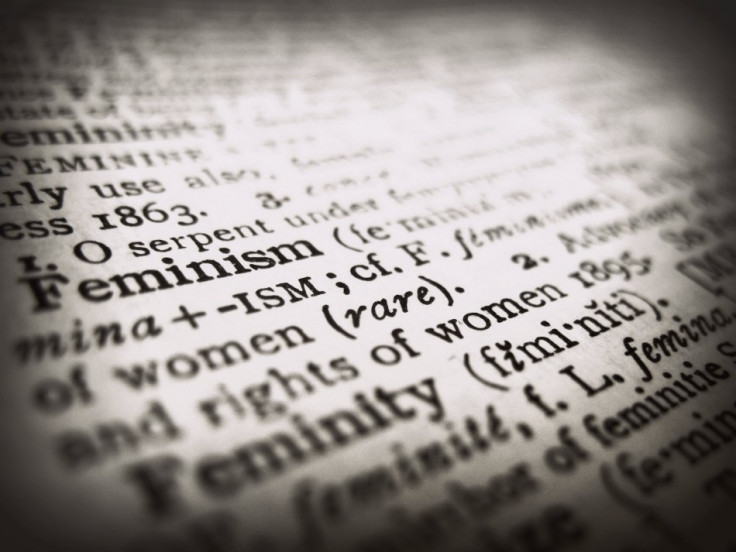Emmeline Pankhurst Day: Why Are We Reluctant to Call Ourselves Feminists?

Today the life of one of the most influential women in British history is celebrated around the world. Around 100 years ago, Emmeline Pankhurst led the fight for women's suffrage – the right to vote. Now, feminism is riding its fourth wave, with a new, ever-changing set of equal rights agendas, such as a decent chance of promotion at work and equal pay.
In one way or another, all women are affected by inequality. On average, 85,000 women are raped in England and Wales each year, but the number of rape convictions in Britain is among the lowest in Europe. Women working full-time earn around £5,000 less a year than men. Only 22% of MPs in the UK are women, and females worldwide are denied education.
Still, the term feminist is still frequently shunned. In a 2013 YouGov poll, 72% of respondents said they did not consider themselves feminists. More women than men – around 38% versus 18% - did identify as a feminist, but in neither group did a majority use the label. Female role models have openly rejected the F-word: Taylor Swift isn't a feminist because she "doesn't think about thing as guys versus girls" and Lady Gaga isn't one because she "loves men".
Feminism is not about hating men, it is about wanting the same rights, privileges and chances that men have. But it is this misconception that steers both women and men from identifying themselves as feminists. It is also why social media campaigns such as #YesAllWomen, in which thousands of women revealed incidences of sexism equally moving, terrifying, enraging and perceptive, sparked the backlash #NotAllMen.
Speaking to IBTimes UK, founder of Everyday Sexism Laura Bates said myth and misconception has been attached to the word feminism for too long. "I think a lot of people avoid using the word simply because they don't really know what it means, and mistakenly think you have to hate men, or want women to rule the world in order to be a feminist," she said.
"But we are definitely seeing a new wave of people embracing what it means to be a feminist in its truest sense: believing that everybody should be treated equally regardless of their sex," Bates explained, adding that there has been a surge of new feminist societies at schools and universities in the UK.
"Over the past couple of years, there has been a wave of online activism, on issues as diverse as female genital mutilation, domestic violence and Page 3. I feel very positive that the word feminism is being reclaimed and that feminism is exploding in interest and energy."
The complex nature of feminism itself is another reason why even women's rights activists are reluctant to call themselves feminists. Not easily definable, feminism is a process – not a finished product. The goals and ideas about equality are regenerated Doctor Who-style with every problem that women face.
During the first wave of feminism a century ago, Pankhurst led the suffragette movement. The second-wave of the 1960s broadened the debate to a wider range of issues, such as sexuality, family, work and reproductive rights, as well as official legal inequalities. The third wave, coined by Rebecca Walker in her 1992 essay, in part, sought to challenge what it deemed the second wave's essentialist definitions of femininity.
The broad nature of feminism means that women are bombarded with questions about what is right, and what is sexist. Should we shave or leave our body hair at 1972? Can we wear make-up? Is it possible to be a feminist housewife? Is marriage sexist? Frustratingly, there is no right or wrong answer.
This subjective nature of feminism has also led some women to cast aside the term feminism, not out of ignorance, but experience. As it evolved, different feminist factions bickered over meanings, gay feminists, male feminists and more. Second-wavers have been criticised for prioritising the interests of white, middle-class women. In 1969, the National Organisation of Women president Betty Friedan lamented the "lavender menace" of political discourse, and some radical groups still seek exclusivity for "women-born-women" feminists, to differentiate themselves from transgender women.
While feminism in the past has suffered from being too insular and exclusive, modern feminism is embracing inclusivity. Caitlin Moran's brilliant, accessible book How to be a Woman made feminism fun, Laurie Penny's sharp insight is always poignant and Laura Bates has provided a platform for all women to expose their experiences of sexism, however seemingly minor or major.
Women are coming around to the idea of calling themselves feminists, because modern feminism has brought the movement back to the basics – improving the lives of women.
Sarah Graham, deputy editor of the Feminist Times, told IBTimes UK: "To me feminism is sisterhood, empathy, and activism that ultimately goes some way towards improving the world for all women. It's looking beyond your own life and oppression and supporting women who are worse off than you."
© Copyright IBTimes 2025. All rights reserved.






















